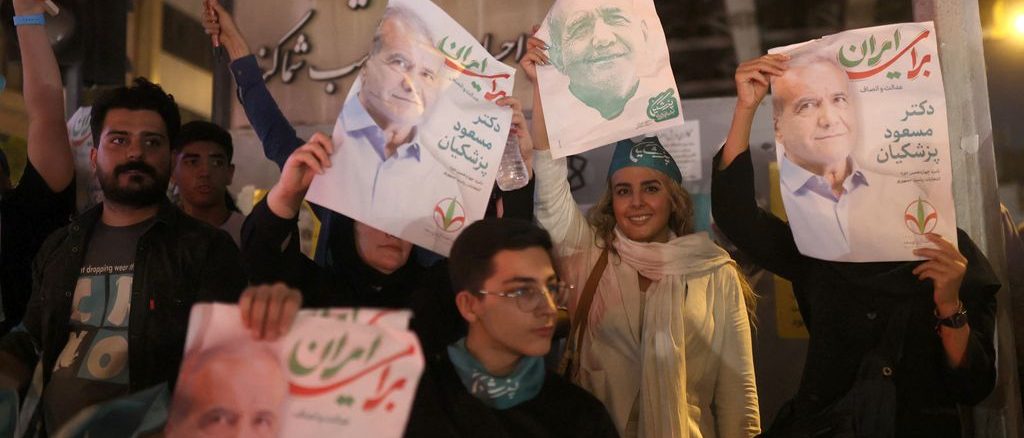
Iran elects new president, but will Iranians go to the polls?
Iran goes to the polls today to elect a successor to President Raisi, who died in a helicopter crash last month. Many Iranians have no intention of voting. They have no confidence that elections matter.
Voter turnout in elections in Iran has been declining for years. In the previous presidential elections, the turnout was 49 percent. Only 41 percent turned out in the parliamentary elections in March this year, the lowest percentage since the Iranian Revolution in 1979. Supreme Leader Khamenei called on voters this week to vote and emphasized the importance of a high turnout.
According to Iranian historian and writer Arash Azizi, Khamenei sees participation in the elections as a sign of the legitimacy of the Islamic Republic. “If turnout remains low despite admitting a reformist candidate, that would be a blow.”
Most notable candidate
The reformist Masoud Pezeshkian is the most striking name in the list of otherwise conservative candidates. The heart surgeon and former health minister stands up for political prisoners and ethnic minorities – he himself is of Kurdish and Azeri descent – and tries to attract young people.
At well-attended campaign rallies, Pezeshkian spoke out in favor of better ties with the West, which should lift the country from its isolation and economic malaise. He is the only one who wants to enter into talks with the US and renegotiate the nuclear program. He also spoke out against the moral police who check women’s clothing on the streets.
He was previously rejected as a candidate by the Guardian Council, constituted directly and indirectly by Khamenei. According to historian and Iran expert Peyman Jafari, the fact that he has now been admitted has to do with concerns about the low turnout. “By allowing Pezeshkian to participate, the Guardian Council hopes to get some of the Iranians who want change to the polls.”
Call for boycott
On social media, activists are calling for a boycott, such as Nobel Prize winner Narges Mohammedi from prison. According to Gamaan, a research agency based in the Netherlands, 65 percent will not vote. The main reason is aversion to the political system. A poll of it Middle East Institute expect the turnout to be above 50 percent.
These are the first presidential elections since the heavy-handed suppression of large-scale protests following the death of Mahsa Amini in 2022. All six candidates, including the conservatives, spoke out against the violence used during the campaign. But young people who supported the protest movement do not find this credible.
“The elections are just a formality, because nothing will really change after this,” says Niusha (25) from Tehran. “Out of all my friends and family, no one is going to vote.” University student Kimia (23) sees little enthusiasm around the elections and is sceptical herself. “If voting actually changed anything in this country, they wouldn’t let us vote.”
That majority has little confidence in the political system, but does not see the possibility of a revolution for the time being.
Iran expert Peyman Jafari
The turnout can be decisive for the outcome. If many progressive Iranians stay home, it could cost Pezeshkian a lot of votes. Young people who participated in the protests will hardly or not vote at all, while conservative Iranians are generally loyal voters.
The question is what the large group between those two extremes will do. “That majority has little confidence in the political system, but does not see the possibility of a revolution for the time being,” says Jafari. “If many of them vote for Pezeshkian in the hope of improvement in daily life, the turnout could go as high as 60 percent.”
It is a risk for the regime that Pezeshkian could actually become president; he is doing well in the polls. But the hardliners Saeed Jalili and Mohammad Bagher Ghalibaf are also popular. Jalili, a former nuclear negotiator, is a conservative who seeks confrontation with the West. Ghalibaf, the speaker of parliament, is slightly more moderate in his tone.
Although the polls predict a low turnout, Azizi thinks there is a chance that the majority of the population will vote anyway, also out of fear of a conservative president like Jalili, who will continue Raisi’s line. “As much as they hate the regime, they see no alternative and that may be why they show up anyway.”
The two conservative candidates Zakani and Hashemi have now withdrawn from the race and are backing Jalili and Ghalibaf, who are doing well in the polls.

Be the first to comment